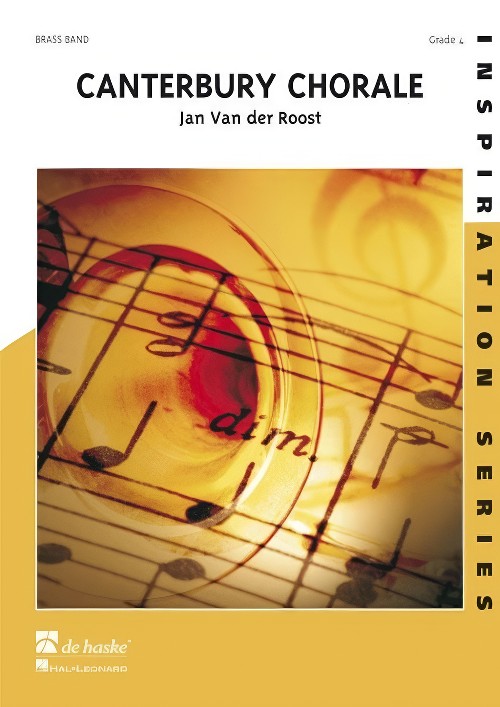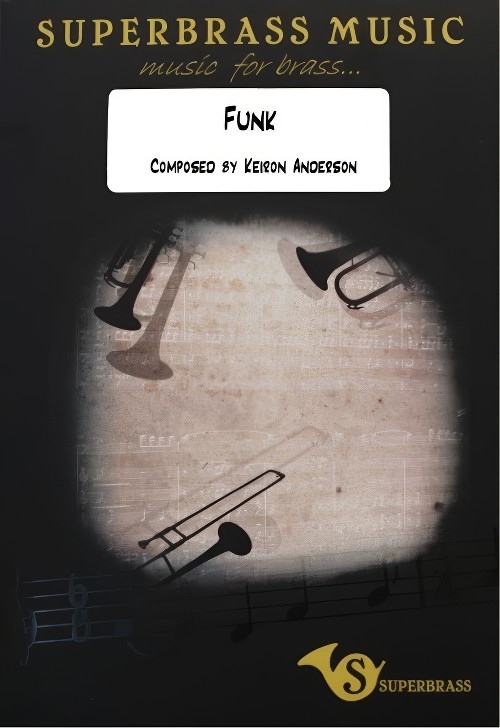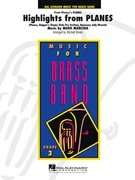Results
-
 £59.99
£59.99Canterbury Chorale (Brass Band - Score and Parts) - Van der Roost, Jan
This quiet piece with its broad tones was originally written for brass band on request of Robert Leveugle, chairman of the composer's own band: Brass Band Midden Brabant (Belgium). The direct cause was a visit to the beautiful cathedral of the English city Canterbury, in which so many fine compositions sounded throughout the centuries. Later on, Jan Van der Roost rescored this piece for symphonic wind band, exploring the full richness of colours of this formation. Besides solo phrases for several instruments, there are some massive tutti passages making the wind orchestra sound like a majestic organ. By the way: an "ad libitum" organ part adds an extra richness, colour and power to this piece, making it sound even more broad and grand.Duration: 6:30
Estimated dispatch 7-14 working days
-
 £38.00
£38.00Funk (Brass Band - Score and Parts) - Anderson, Keiron
The driving rhythms and lush harmonies of funk music is a perfect vehicle for the tight, dynamic playing of a solid brass band. The brass sections of Tower of Power and Earth, Wind and Fire inspired players from the 1980s onwards and being part of this type of rhythmic force is a great experience. This piece is designed to be rewarding for all the performers and of course the most important group; the audience! Duraion: 4.00. Suitable for 1st Section Bands and above.
Estimated dispatch 7-14 working days
-
 £38.95
£38.95Unity Series Band Journal - Numbers 510 - 513, October 2022
510: March - There is a fountain (Zachary Docter)This bright and cheerful march takes two songs as its basis; Jesus loves me! This I know (S.A.S.B. 807) and There is a fountain (S.A.S.B 202).511: Shine, Jesus, shine (Marcus Venables)While this piece was originally written for young people at a summer music camp in Canada, the piece is a light programme item suitable for smaller ensembles of any age.512: My Trust (Alan Williams)This setting is based on the simple chorus In thee, O Lord, do I put my trust (S.A.S.B 594). Ordinarily heard in 3/4 times, this 4/4 version of the tune has the space for reflection written into the notation.513: Power in the blood (Martyn Thomas)This is a blues/rock arrangement of the traditional hymn Would you be free from your burden of sin? (S.A.S.B 451). It can be used as a stand-alone piece or equally well as an accompaniment for congregational singing.
Estimated dispatch 7-14 working days
-
 £115.60
£115.60Sovnlaus - Haugen Haugen
Hellbillies is a Norwegian rock band founded in 1990 in the small village of Al, Hallingdal. They are now among the most popular bands in Norway with 16 CD-releases. They are awarded the Norwegian "Spellemannsprisen" (an equivalent to Grammy) several times. "Sovnlaus" ("Sleepless") is the title track from their last record album released in 2016. It's a typical powerful rock song and should be played with power and precision.
Estimated dispatch 5-14 working days
-
 £60.99
£60.99Where there's Muck - Peter Martin
The title is a popular saying in England. It means that's where the money is. "Where there's muck, there's power" is such a popular expression in the United Kingdom. The saying inspired Peter Martin to compose a highly attractive piece in four parts, consisting of contemporary dances that can also be performed separately. Let's dance!
Estimated dispatch 5-14 working days
-
 £60.99
£60.99Highlights from Planes - Mark Mancina
For the Disney animated film Planes, composer Mark Mancina created an outstanding orchestral score filled with power and depth. Michael Brown's skillful adaptation for young band brings all the majestic qualities of the original to the concert stage.
Estimated dispatch 5-14 working days
-
 £60.99
£60.99PLANES, Highlights from (Brass Band) - Mancina, Mark - Brown, Michael
For the Disney animated film Planes, composer Mark Mancina created an outstanding orchestral score filled with power and depth. Michael Brown's skilful adaptation for young band brings all the majestic qualities of the original to the concert stage. Includes: Planes, Skipper's Theme (Volo Pro Veritas) and Honorary Jolly Wrench. Grade: medium. Duration: 4:50
Estimated dispatch 7-14 working days
-
 £30.00
£30.00Funk - Keiron Anderson
The driving rhythms and lush harmonies of funk music is a perfect vehicle for the tight, dynamic playing of a solid brass group. The brass sections of Tower of Power and Earth, Wind and Fire inspired players from the 1980s onwards and being part of this type of rhythmic force is a great experience. This piece is designed to be rewarding for all the performers and of course the most important group; the audience.
